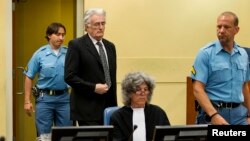The verdict that a U.N. tribunal will hand down next week in Bosnian Serb leader Radovan Karadzic's trial for genocide has re-opened old wounds for many Bosnians, who for years feared him as the "master of life and death".
The long-awaited decision by the war crimes tribunal in The Hague, to be handed down on Thursday after a five-year trial, reminds Bosnians that Karadzic's legacy lives on in a country still divided along ethnic lines two decades after the war that killed 100,000 people.
He remains a deeply divisive figure, hated by Muslim Bosniaks and Croats but championed by many Serbs who say he has been demonized by the international community.
"Karadzic is the most responsible for everything that happened in Bosnia," said Fikret Grabovica, whose 11-year-old daughter was killed by a Serb grenade in front of their Sarajevo home 23 years ago.
"He needs to be remembered as one of the greatest criminals of the recent history and not, as some would wish, as a national hero."
Grabovica's daughter Irma was among 600 children killed by random shelling or sniper fire during the 43-month siege of the Sarajevo by Bosnian Serb forces, the longest siege of a city in Europe's modern history, in which around 11,500 people died.
If he is found guilty, Karadzic would be Europe's highest-ranking official since the Nazi trials after World War Two to be sentenced for genocide by an international court.
Prosecutors have asked for a life sentence. Now 70, Karadzic was the first president of the self-declared Republika Srpska, which the Bosnian Serbs tried to
carve out of Bosnia and link to Serbia and which survives as an autonomous part of Bosnia under the U.S.-brokered Dayton peace accords that ended the 1992-95 war.
He is widely seen as the mastermind behind the Bosnian Serb campaign of ethnic cleansing that forced two million people from their homes and led to thousands being held, tortured and raped in detention camps.
The International Criminal Tribunal for the Former Yugoslavia (ICTY) charged the former psychiatrist with 11 counts of genocide and crimes against humanity, including the Srebrenica massacre, where Bosnian Serb forces slaughtered about 8,000 Muslim men and boys in just a few days in July 1995.
A warning
Kada Hotic, a Srebrenica survivor who lost her husband and son in the massacre, said the verdict was important to show that "such an evil is punishable (and) as a warning to those who would dare to push the people into doing crimes in the future."
The Bosnian war broke out after Bosniaks and Croats voted for independence from the former Yugoslav federation in a 1992 referendum boycotted by Serbs.
Under Karadzic's leadership, Serbs occupied 70 percent of the country, killing and persecuting Muslims and Croats. A year later, war broke out between Muslims and Croats, previously allied against Serbs.
Most Serbs deny that crimes were committed during the war.
Current Serb Republic President Milorad Dodik has said that Karadzic did not order any crimes and argued that the massacre in Srebrenica was not genocide, although the tribunal has ruled that it was. Dodik's view is widely shared by Serbian officials.
"As long as you have in Bosnia three different history books used by the Serbian, Croatian and Bosniak communities with a totally different assessment about not only the war but the last 200 years... how do you want to move forward?" ICTY Chief Prosecutor Serge Brammertz said in The Hague last week.
The Srebrenica killings were conducted under the command of Karadzic's military chief, General Ratko Mladic, whose trial, also on charges of genocide, is under way at The Hague.
Karadzic was arrested in 2008 after 11 years on the run in Belgrade, where he had lived disguised as a white-bearded New Age healer.
He said that he would defend himself alone and easily prove his innocence. He also maintained that the late U.S. peace mediator Richard Holbrooke offered him immunity from prosecution in a secret deal, which Holbrooke denied.
Legacy lives on
The effects of the war are felt today in the political structure of modern-day Bosnia, which is made up of the Serb Republic that Karadzic established and a federation shared by Bosnian Muslims, or Bosniaks, and Croats. They are linked via a weak central government whose decisions are usually disputed by the Serb region, which often threatens secession.
"Karadzic's political legacy is very much alive and it still shapes the lives of our children," Bosnian Serb commentator Srdjan Susnica said.
"It's all there - the borders, the name, the symbols, the legal and political legitimacy, the ethnically cleansed municipalities in Republika Srpska - so I think that he succeeded in everything he wanted," he told Reuters.
"Whatever his sentence will be, it won't make any significant difference, because the political territory, which was created on genocide and national homogenisation, first of Serbs and then of all others, lives on."
Karadzic's daughter Sonja Karadzic Jovicevic, who serves as a vice-chairman of the Serb Republic's parliament, said in a statement on Thursday she feared that a guilty verdict could endanger the region's institutions.
Momcilo Krajisnik, Karadzic's wartime ally who was released in 2013 after serving a prison term for persecution and forcible transfer of civilians during the war, maintains that Karadzic is not guilty, and argues that reconciliation is possible only through forgiveness.
"Apologies are not needed or possible here, we need forgiveness, that everyone forgives everyone else," said Krajisnik, 71.
But forgiveness cannot come without recognition that crimes were committed, says Radoslava Habul, a Serb married to a Bosniak whose son was killed and daughter injured by a mortar shell in Sarajevo.
"If those who committed crimes go through the catharsis, we shall accept them and live together," she said.





